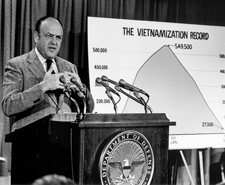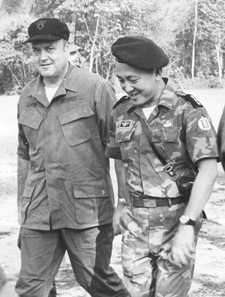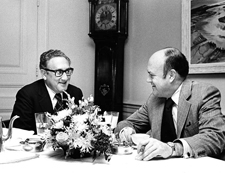With Honor
Melvin Laird in War, Peace, and Politics
Dale Van Atta
Foreword by President Gerald R. Ford
Publication date April 2008
LC: 2007040159 E
648 pp. 6 x 9 40 b/w illus.
ISBN-13: 978-0-299-22680-0
Cloth $35.00 t
Press Release:
The University of Wisconsin Press
1930 Monroe Street, 3rd Floor, Madison Wisconsin 53711
FOR
IMMEDIATE RELEASE
PRINT MEDIA: For more information, or to arrange for an interview, please contact Chris Caldwell, publicity manager, UW Press, Ph (608) 263-0734, email: publicity@uwpress.wisc.edu
BROADCAST MEDIA: For more information, or to arrange for an interview, please contact Chris Schellpfeffer, VP Director of PR, Lindsay, Stone & Briggs. Ph (608) 251-7070,
email: cschell@lsb.com
“[Laird] exemplifies a magical blend of principle and pragmatism that is sorely needed in our country today.”—President Gerald R. Ford
In 1968, at the peak of the Vietnam War, centrist Congressman Melvin Laird (R-WI) agreed to serve as Richard Nixon’s secretary of defense. It was not, Laird knew, a move likely to endear him to the American public—but as he later said, “Nixon couldn’t find anybody else who wanted the damn job.” For the next four years, Laird deftly navigated the morass of the war he had inherited. Lampooned as a “missile head,” but decisive in crafting an exit strategy, he doggedly pursued his program of Vietnamization, initiating the withdrawal of U.S. military personnel and gradually ceding combat responsibilities to South Vietnam. In fighting to bring the troops home faster, pressing for more humane treatment of POWs, and helping to end the draft, Laird employed a powerful blend of disarming Midwestern candor and Washington savvy, as he sought a high moral road bent on Nixon’s oft-stated (and politically instrumental) goal of peace with honor.
The first book ever to focus on Laird’s legacy, this authorized biography reveals his central and often unrecognized role in managing the crisis of national identity sparked by the Vietnam War—and the challenges, ethical and political, that confronted him along the way. Drawing on exclusive interviews with Laird, Henry Kissinger, Gerald Ford, and numerous others, author Dale Van Atta offers a sympathetic portrait of a man striving for open government in an atmosphere fraught with secrecy. Van Atta illuminates the inner workings of high politics: Laird’s behind-the-scenes sparring with Kissinger over policy, his decisions to ignore Nixon’s wilder directives, his formative impact on arms control and health care, his key role in the selection of Ford for vice president, his frustration with the country’s abandonment of Vietnamization, and, in later years, his unheeded warning to Donald Rumsfeld that “it’s a helluva lot easier to get into a war than to get out of one.”
Dale Van Atta is the author of Trust Betrayed: Inside the AARP and, with Jack Anderson, Stormin’ Norman: An American Hero. He lives in Washington, D. C. |
Blurbs:
“[Laird] exemplifies a blend of principle and pragmatism that is sorely needed in our country today.”—President Gerald R. Ford
“Historians, journalists, and other observers have become so entangled in debates about Kennedy and Johnson in the 1960s, and Nixon and Kissinger in the 1970s, that they have neglected the formidable role of Melvin Laird. This clearly written biography will rectify that oversight.”—Jeremi Suri, author of Henry Kissinger and the American Century
“Watching Laird operate, I sometimes wondered if Nixon realized what he had gotten when he picked Laird.”—Bob Schieffer, commentator on CBS’s Face the Nation
Author's
Bio:
Dale Van Atta is the author of Trust Betrayed: Inside the AARP and, with Jack Anderson, Stormin’ Norman: An American Hero. He lives in Washington, D.C.
For more information, in addition to this
press kit, contact our publicity manager, Chris Caldwell, phone: (608) 263-0734,
email: publicity@uwpress.wisc.edu
|
|
Cover image:

This cover image can be downloaded
and used in any web-based publicity for this book. For
a larger version for print publicity, click here.
Author Photo:

This image can be downloaded
and used in any web-based publicity for this book. For
a larger version for print publicity, click here. It is provided courtesy of United Feature Syndicate.
Other photos:

Melvin Laird illustrating the rate of troop withdrawals. From the personal collection of Melvin Laird. © 2007, private collection of Melvin Laird. For use in publicity for this book only.

This photo of Melvin Laird with South Vietnamese General Ngo Quang Truong is in the book, and is used with permission, from Melvin Laird's personal collection. It is for use in publicity for this book only.
© 2007, private collection of Melvin Laird.

This photo of Melvin Laird in conversation with Henry Kissinger is used with permission, from Melvin Laird's personal collection. It is for use in publicity for this book only. © 2007, private collection of Melvin Laird.
|
Reviews:
"There are three story lines in this authorized biography. The most prominent and both best and least known is getting out of Viet Nam It's surprisely timely as Laird's warning to first Bush Secretary of Defense Donald Rumsfeld—"It's a helluva lot easier to get into a war than it is to get out of one"—plays out in 2008 headlines. . . .
One of the most cogent quotes from the book was Laird's advice to the military, the White Hose, and anyone else who would listen that "time has run out."—Wispolitics.com, April 16, 2008
"Possibly the most distinguished politician to come out of Wisconsin, Laird took on the thankless task of trying to end the war and to deal, at the same time, with Nixon, Henry Kissinger and the other bizarre characters of the time.
It is the first book to focus on Laird's legacy, according to the UW Press." —Wisconsin State Journal, April 16, 2008
"In placing Laird at the center of the era, Van Atta has made a significant contribution. His research is based on hundreds of interviews with subjects including Kissinger and Laird's friend and political ally, the late President Ford, who contributed the foreword. Recommended for larger academic and public libraries and essential for any Wisconsin library."—Bob Nardini, Library Journal, April 1, 2008
Excerpt
“The last job Melvin Laird wanted in the fall of 1968 was that of secretary of defense. The Vietnam War was at its bloody apex, and public support for the war was at its nadir. Richard Nixon had just been elected president of the United States based on a rumored “secret plan” to end the war. But Laird knew his old friend Nixon had no such plan. The only plan was to scour the ranks of the unwilling and find someone to be secretary of defense, someone who would then figure out how to pull the
United States from the Vietnam quagmire.
Laird had just been elected to his ninth term in Congress representing his beloved state of Wisconsin, and there was no place he would rather be than in the House of Representatives. Since the election, Nixon had leaned heavily on Laird to help him find a defense secretary, preferably a Democrat for the sake of interparty relations. Laird proposed Senator Henry “Scoop” Jackson of Washington. He was a hawkish advocate of strong military power as well as conservative about national security. Jackson was willing to consider the job, but when he went to a Democratic retreat in Hawaii and told
some of his friends about it, Senator Edward Kennedy tore into him. . . . Jackson phoned Nixon from Hawaii with his regrets. It was December, and the press was clamoring for Nixon’s cabinet slate. He turned his wrath on Laird over the Jackson debacle and ordered Laird to come to the annual meeting of the Republican Governors Association at Palm Springs, California, where the two of them would work on the problem. “You got me into this mess. You’re going to damn well fix it!” Nixon told Laird.
Laird was in the greatest quandary of his life as he boarded Nixon’s jet for the return trip to D.C. Ford was on the plane, as was veteran political operative Bryce Harlow, whom Nixon had named as his legislative affairs liaison. Harlow had joined Laird in lobbying for Jackson for defense secretary, and Nixon’s opening blast was directed at both advisors. “You sons of bitches!” Nixon sputtered. “You talked me into this thing with Scoop and now he’s backed out.” Then he turned on Laird. “There’s only one way to fix this—I’m going to announce YOU for defense secretary!”
“The hell you are!” Laird countered. “I’m not going to leave Congress.” During an extended debate on the cross-country flight, Laird outlined reasons why it would be better for the new administration if he remained in Congress. Nixon’s response is summed up in a letter he later wrote to Laird: “I made the hard sell—even though a friend was involved. I know this was a terribly difficult decision for you to make, but you were the indispensable man—the right man for the right place, at the right time.”—from the prologue, With Honor
[Return
to the book page for With Honor] |




